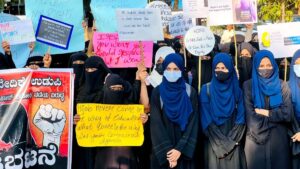 Moon Desk: Moon Desk: Muslims have experienced discrimination in areas including employment, education, and housing . Many encounter barriers to achieving political power and wealth, and lack access to health care and basic services. Moreover, they often struggle to secure justice after suffering discrimination, despite constitutional protections.
Moon Desk: Moon Desk: Muslims have experienced discrimination in areas including employment, education, and housing . Many encounter barriers to achieving political power and wealth, and lack access to health care and basic services. Moreover, they often struggle to secure justice after suffering discrimination, despite constitutional protections.
Over the last two decades, the representation of Muslims in parliament has stagnated: after the 2019 elections, Muslims held just 5 percent of seats. That’s partly due to the rise of the BJP, which by mid-2022 had no Muslim members of its party in parliament.
Meanwhile, a 2019 report by India-based nongovernmental organization Common Cause found that half of police surveyed showed anti-Muslim bias, making them less likely to intervene to stop crimes against Muslims. Analysts have also noted widespread impunity for those who attack Muslims. In recent years, courts and government bodies have sometimes overturned convictions or withdrawn cases that accused Hindus of involvement in violence against Muslims. States have increasingly passed laws restricting Muslims’ religious freedoms, including anti-conversion laws and bans on wearing headscarves in school.
In addition, authorities have turned to extrajudicial means to punish Muslims, through a practice critics call “bulldozer justice.” In 2022, authorities in several states destroyed people’s homes, alleging that the demolished buildings lacked proper permits. However, critics said they primarily targeted Muslims, some of whom had recently participated in protests. In response, India’s Supreme Court said that demolitions “cannot be retaliatory,” though the practice has continued.
In December 2019, the parliament passed and Modi signed the Citizenship Amendment Act, which allows for the fast-tracking of citizenship for Hindu, Sikh, Buddhist, Jain, Parsi, and Christian migrants from Afghanistan, Bangladesh, and Pakistan. Critics say the law is discriminatory because it excludes Muslims and applies a religious criteria for the first time to the question of citizenship. The Modi government argues that the law is designed to provide protection for vulnerable religious minorities who faced persecution in these three Muslim-majority countries.
At the same time, the BJP promised in its 2019 election manifesto to complete a National Register of Citizens (NRC). The NRC was created in the 1950s for the unique case of the state of Assam to determine whether residents were Indian citizens or migrants from what is now neighboring Bangladesh. In 2019, the Assam government updated its register, which excluded nearly two million people. If implemented nationwide, all Indians would be required to prove their citizenship. Critics say this process could render many Muslims stateless because they lack necessary documents and are not eligible for fast-tracked citizenship under the Citizenship Amendment Act.
Modi has meanwhile diminished the political standing of what was India’s only Muslim-majority state: Jammu and Kashmir. In August 2019, the government split the state, which lies in the mountainous border region in dispute with Pakistan, into two territories and stripped away its special constitutional autonomy. Since then, Indian authorities have cracked down on the rights of people in the region, oftentimes under the guise of maintaining security. They shut down the internet eighty-five times in 2021, harassed and arrested journalists, and detained prominent political figures and activists. Dozens of civilians have been killed by armed groups since the division, despite government claims that the security situation had improved.
“The longer Hindu nationalists are in power, the greater the change will be to Muslims’ status and the harder it will be to reverse such changes,” says Ashutosh Varshney, an expert on Indian intercommunal conflict at Brown University.





